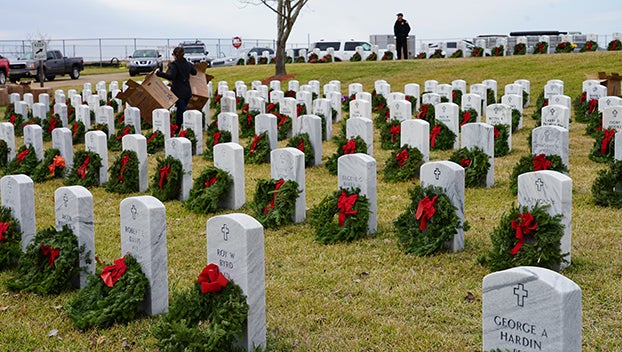Battles with parish flooding head to ballot box Saturday
Published 12:01 am Sunday, December 2, 2012

File photo — A cactus was about the only plant that peeked its foliage above the flood waters on Apple Street in Vidalia during flash flooding in August 2010.
By VERSHAL HOGAN & LINDSEY SHELTON
VIDALIA — Concordia Parish voters will take to the polls Saturday to vote for — or against — a tax that officials say will determine whether many locals can save their waders for the fishing hole, not the yard.
Parish residents will vote “yes” or “no” for a proposed one-mill drainage tax that, if passed, will fund the operation and maintenance of levee drainage structures for the parish’s Black River Lake and Brushy Bayou drainage projects.
The tax is expected to generate $133,700 annually.
Millage will not be collected until all permits, approvals and authorizations have been received for construction. A half mill will be collected after each structure is approved.
The tax increase is the police jury’s solution to getting the $3.5 million in funding for the Black River Lake drainage project released. The funding will not be released until an organization agrees to provide upkeep and maintenance after construction.
The Black River Lake Commission, set up several years ago to help manage the Black River drainage area, also known as the Horseshoe Complex, was allocated $1 million in priority 1 funding and $2.5 million in priority 5 funding for drainage structure installation, studies, permits and construction.
The structure would be two 10-foot box drainage tanks, with cutoff gates that would be installed with 3-foot intervals to control water levels in the Black River Lake area.
At Brushy Bayou in the northwest part of the parish, the drainage committee wants to take $25,000 acres and divert it into the Tensas River, committee member Bill Beasley said.
Because the parish is flat, Beasley said, one of the main issues with drainage is elevation. Beasley said the goal is to lower the elevation of water two feet in several parts of the parish.
The new drainage plan, Beasley said, is how parish drainage flowed prior to the ring levee system being constructed in 1955.
Concordia Parish Police Jury President Melvin Ferrington said he has been working to improve parish drainage for more than 20 years.
“This is the closest we have come to having a good drainage system,” he said.
Ferrington said he knows many parish residents are plagued by drainage problems, and he believes the tax will prevail when it comes to a vote.
“But if we miss this opportunity to get this grant because of a one-mill tax, if that’s what the people want, that’s fine,” he said. “But we are not going to quit if this fails, we’ll try another avenue.
“I just think it’s virtually a small price to pay for good drainage for the future of our parish,” Ferrington said.
The cost to property owners is as follows:
• $75,000 home: no cost
• $100,000 home: $2.50
• $200,000 home: $12.50
• 100 acres of agriculture land: approximately $1.89-$3.47
• 100 acres of timber land: approximately $.75-$3.87
Ferriday Mayor Gene Allen said he does not endorse the tax and has had calls from Ferriday residents saying they will not vote for the tax.
“We never having flooding problems in Ferriday,” Allen said. “And I don’t think the people of Ferriday are going to support the tax.”
That is not true for Ferriday resident Linda Hopper.
When it starts raining, Hopper, who lives in the Washington Heights area, doesn’t reach for an umbrella. She reaches for a mop.
That’s because there’s always a chance her house is going to take on water. It doesn’t happen every time, but it’s something she watches for when the rain starts failing.
“You stand at the door and watch the water coming up,” she said. “If you walk out into the yard with boots on, you have water coming up inside the boots — you just about need a boat to get out of here.”
The ground in the area is already unstable — it’s what locals call gumbo soil — and Hopper said when a good rain comes through she can observe the shifts in her home’s foundation — a door that couldn’t close now can, or vice versa.
One day, a strong rain came through, and Hopper spent the next 24 hours alternately watching the water rise and fighting it out of her house.
“When the water started coming in, I just started mopping, and when it came into my hall, the water was just laying there — it messed up my sheetrock,” she said.
Those experiences, Hopper said, have pushed her toward voting in favor of passing the one-mill tax for drainage on Saturday’s ballot.
Vivian Carter, another Washington Heights resident, said she believes that if the tax passes, whatever it costs her will be worth it to not have to keep sandbags at her house anymore.
“Whenever they say ‘rain,’ I always clam up, because if it is so many inches I will get water in my house,” she said. “I will do anything to try to get this water to move out of our neighborhood.”






